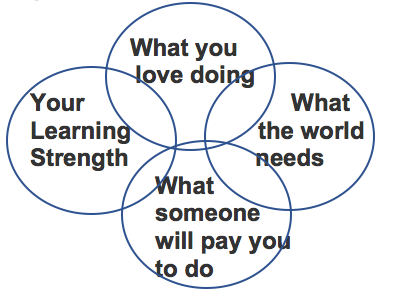
Leading clinical psychologist Andrew Fuller has developed a new approach to identify a student's learning strengths.
The 300 trillion connections between your brain cells have an amazing amount of processing power. The way your brain processes information is as unique to you as your fingerprints.
All of your life experiences, thoughts, memories, your ancestry and a considerable amount of your future is in the connections inside your head.
The brain cells called neurons don’t just live in your head. You have about as many neurons in your stomach as a cat does in its head.
Good News: you’re Smarter
There is evidence that people are getting smarter. This is partly due to all of the different types of stimulation your brain gets every day compared with your distant ancestors.
Now add to that all of the things you use to increase your brain power – smart phones, YouTube clips, TED Talks, books, computers – and you have an increase in human potential that has never been seen before.
Using your Brain to Help you be more Successful
Success involves working out what you enjoy and are good at and doing more of it. As well as working out what you are not so good at and doing less of it.
Success involves finding the intersection as shown here, starting with knowing your learning strengths. This is based on how your brain functions.

Hacks for Smarter Thinking
Neuroplasticity is your brain’s ability to change. When we practice in areas we aren’t developed in, we improve. Even just a few minutes practice a day for 30 days changes your brain.
Identify your Learning Strengths
By identifying your learning strengths you can capitalise on areas where you are strong and build these into powerful areas of expertise. Always remember, in life you don’t need to be good at everything.
Building your Strengths
Learning how to play to your strengths is a major advantage in life. For example, if you are someone who thinks well in pictures (spatial reasoning) you will do best when you write or draw things out. Using flow charts, maps, diagrams, post-it notes and cartoons will help you succeed.

Using your Strengths to Develop Another Area
Let’s say you are someone who has learning strengths in spatial reasoning and also in perceptual/motor skills. Let’s also say for example, an area you are yet to develop in is number smarts.
Learning to use your strength areas to build another requires cross fertilisation of skills. In this example, you might outline number formulas as a series of pictures or movements or you might want to make calculations physical by stepping through a problem or pacing out the dimensions of an issue or imagining the mathematics problem as a series of pictures each needing to be solved.
Turn Anxiety into Action
Everyone gets anxious when something is difficult to learn. Anxiety is a message to your body to mobilise for action. Stress really becomes a big problem when we become immobilised by it and don’t do anything.
Learning how to use your learning strength areas to increase your performance takes some planning but the outcomes are large. The reduction in performance disabling anxiety is substantial.
Develop your own Individual Learning Plan
When students and parents know the learning strengths and areas yet to be develop, they are better equipped to work with teachers to prioritise learning strategies over the next term or semester.
Don’t be a Learning Zombie
Just one hour less sleep a night can almost halve your smarts. Add to that a lot of sugar and you’ll zone out big time. Sure, the sugar high will feel great but the sugar crash will have you feeling like one of the ‘walking dead’.
A free learning skills letter can be accessed here, and a personalised learning plan is also available for a nominal fee. The approach is most powerful when school staff receive training in neuro-developmental differentiation. Click here to find out more.
Andrew is a clinical psychologist specialising in the wellbeing of young people and their families.
Stay in touch with Andrew on Facebook, on LinkedIn. More tips about how to maximise your success can be found at:
Andrew’s websites
www.andrewfuller.com.au
www.mylearningstrengths.com (45,000 young people in the past year discovered their learning strengths and found how to increase success and motivation).
Books for parents
Tricky Conversations
Tricky Teens and Emerging Adults: A survival guide for parents
Unlocking Your Child’s Genius: How to discover and encourage your child’s natural talents
Books for teachers
Guerilla Tactics for Teachers: The Essential Classroom Management Guide
Work Smarter, Not Harder: Study skills for students who dislike homework
Tricky Conversations: How to have less conflict and more peace in your life
Neurodevelopmental Differentiation: Optimising Brain Systems to Maximise Learning



